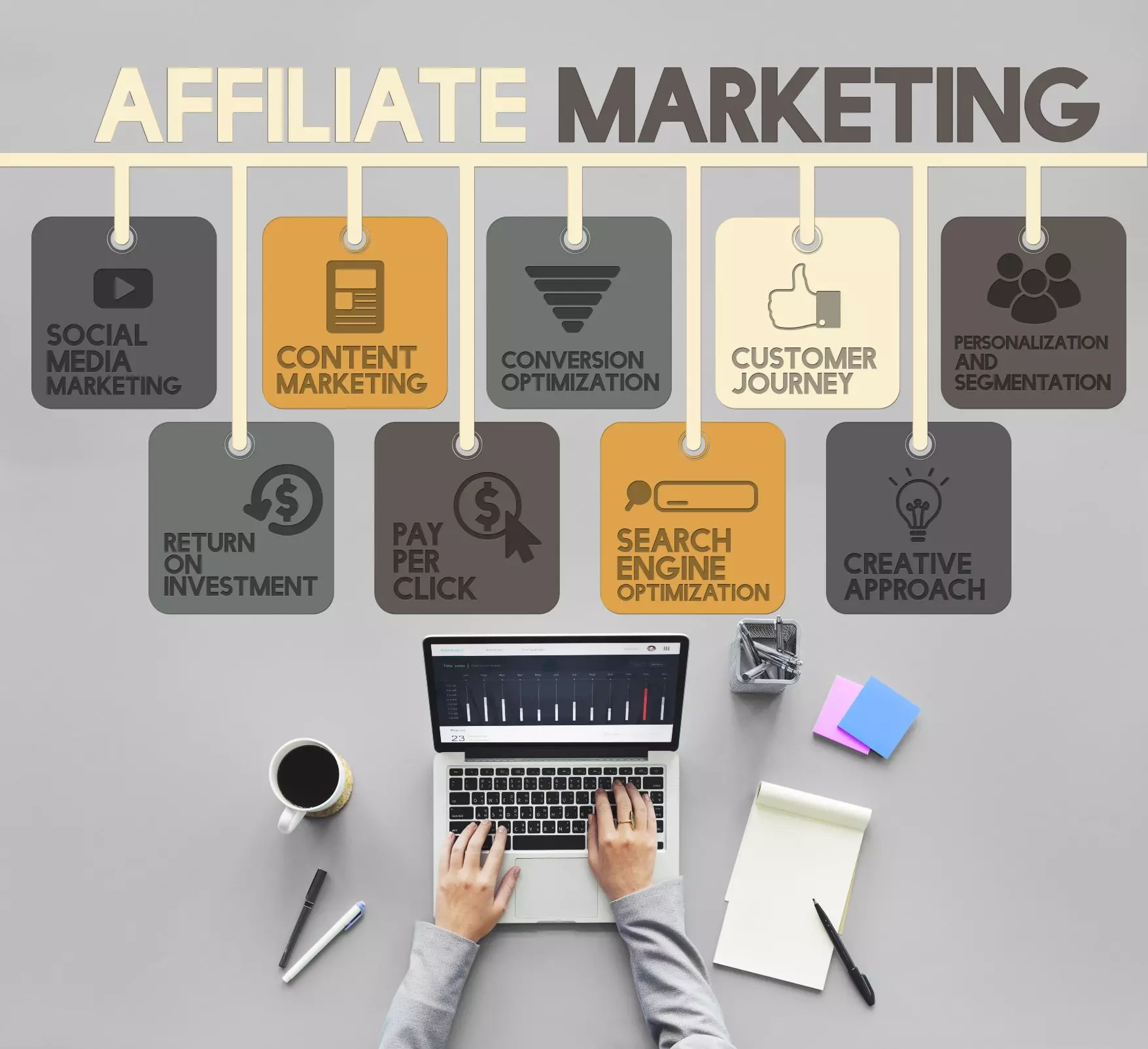“Nobody counts the number of ads you run; they just remember the impression you make.”
Bill Bernbach, an American advertising creative director
How can you make an impression with PPC affiliate marketing? This type of marketing is about the pay-per-click online advertising model. In this case, advertisers pay a publisher, such as an affiliate marketer owning a website, when their ad displayed on the publisher’s site is clicked.
Advertisers drive more demand mainly with the help of ad placement and audience targeting, as HubSpot 2020 statistics show. For example, 63% of people have clicked on a Google ad in 2019, according to Clutch.
PPC affiliate marketing programs can be quite valuable for advertisers with websites that boast sustainable traffic. Let’s dig deeper into this type of marketing to reveal its challenges and benefits.
What Is a Pay-Per-Click Program?
First, let’s look at the pay-per-click (PPC) or cost-per-click (CPC) digital advertising model. Through this model, advertisers pay publishers a fee for every click the advertisement receives.
PPC advertising is mainly offered by search engine publishers such as Google and social networks such as Facebook. Specifically, the search engine result page (SERP) shows the ad to users when they type in specific keywords or phrases related to the offering.

What about a PPC affiliate program? Pay-per-click affiliate programs are one of the models of online or Internet marketing. Think of it as an agreement between an advertiser and an affiliate marketer. PPC affiliate marketers promote the advertiser’s offers to their audience.
Advertisers pay the affiliate marketer a commission for sending traffic their way. Traffic can come through web content, social media, or product integration. The advertiser gives the marketer a unique link, an affiliate link, from which the marketer can track clicks.
For example, if an affiliate marketer displays an ad for a sportswear company on their website and someone visiting the site clicks on this ad, the consumer will be redirected to the advertiser’s website. If the consumer then makes a purchase, the marketer earns a portion of the revenue.
According to eMarketer, advertisers are forecast to spend $99.22 billion on search engine advertising in 2024. The majority of Google’s advertising revenue comes from search advertising, reaching $209.49 billion in 2021. This search engine giant generates advertising revenue through its Google Ads advertising platform.
Benefits of Pay-Per-Click Affiliate Programs
In 2022, Internet advertising spending is anticipated to grow by about 13.5%. Most businesses use pay-per-click advertising to invest in search engine marketing. Specific keywords and phrases help companies bid for placement at the top of search engine results pages.
Affiliate marketing pay-per-click can help:
- Market your business
- Drive traffic
- Promote your offerings
- Reach new customers
- Collect leads
- Boost your sales and conversions (when a website visitor completes a desired goal, e.g., fills out a form or makes a purchase).
How to Make Money with Pay-Per-Click Affiliate Programs
The United States represents the world’s biggest advertising market. Ad spending accounted for $250 billion in 2020. So, let’s look at how to make money with a PPC affiliate program.
PPC is one of the best advertising methods your company can use to generate revenue because it enables businesses to reach their target audience faster by specifying who will see their ads. With proper implementation, your business can attract customers without spending much. To start, you need to have an audience to promote your products or services to. For this, you can use a mailing list, website, social media following, or paid ads.

Here, it’s essential to know about “earnings per click” (EPC), which is run through PPC ads. This affiliate marketing term refers to the average amount of money earned each time someone clicks one of the affiliate links. To calculate EPC, divide the total profit from the ad by the number of clicks it received.
For example, if the total profit is $100 from 50 clicks, EPC would be $100 (profit) / 50 (total clicks) = $2.
Interestingly, Google says that for every $1 a business spends on an ad, the company generates $8 in profits.
Google AdSense & Its Alternatives
When discussing PPC advertising, it’s essential to talk about Google AdSense. This is the most popular advertising program that can help you monetize traffic. Google AdSense is safe, secure, and transparent. However, Google AdSense isn’t the only option. You can also choose Google AdSense alternatives, such as:
- Media.net: Recommended for established bloggers
- PropellerAds: Recommended for pop-unders. A pop-up advertisement is one that opens behind a browser’s active window, and the advertisement is seen when the active window gets closed.
- Monumetric: Recommended for mid-sized blogs
One of the reasons why you can opt for AdSense alternatives is that AdSense requires marketers to meet specific metrics before partnering. Overall, a good advertising program should enable you to make money as you grow your site.
Frequently Asked Questions About Pay-Per-Click Affiliate Programs
Here’s a list of questions people interested in pay-per-click affiliate programs usually ask:
Is Pay-Per-Click Similar to Affiliate Marketing?
PPC marketing allows advertisers to pay a fee each time their ad is clicked. So, this is about paying for your ads to be clicked so you can get traffic to your site.
Pay-per-click affiliate marketing is about getting paid when people click on ads on your site. In this case, you’re getting paid instead of paying.
What Are The Highest-Paying PPC Affiliate Programs?
There are several pay-per-click affiliate marketing programs that can bring you high revenue. Below, you can find some of them:
- Google AdSense: You can start receiving payments after reaching a $100 payment threshold.
- Mediavine: The minimum payout is $25. This program offers a NET-65 payment structure, implying that you can have money in your account after a few months.
- AdThrive: This program offers 20% revenue-per-mille (RPM) or 1,000 page views. With ADThrive, within your first two weeks, you can hit a 20% higher RPM without increasing the ads on the site.
- BeRush: Offers 40% recurring commission (up to $120 commission per sale).
- Mangools: Offers 30% recurring commission (up to $300 commission per sale, on annual billings).
How Can I Do PPC Affiliate Marketing with No Money?
Affiliate marketing is on the rise. The U.S. affiliate marketing spending was projected to reach $8.2 billion by 2022, up from $5.4 billion in 2017. What if you’re interested in this type of marketing but have no upfront money? Thankfully, lack of funds isn’t a problem.
You don’t need to pay to open an account on affiliate marketing platforms and create content. Specifically, your company can access affiliate networks for free and enjoy thousands of reputable programs right away. So, you can start earning money rather than spending it.
Challenges in PPC Affiliate Marketing
PPC affiliate marketing is a highly competitive space and comes with more than one challenge. These can include:
Low Profitability
Profit is based on how many people see and interact with the posted ad. To succeed, you should find an interested audience that will interact with the ad and click on it.
To fight the problem of low profitability, you need to create an appealing PPC ad so it can collect many clicks. Both the content on the affiliate landing page and the ad headline should be catchy to pique the user’s interest.

As strategic communications leader David Ogilvy said, “On average, five times as many people read the headline as read the body copy. When you have written your headline, you have spent eighty cents out of your dollar.”
Even if your ad isn’t bidding on branded keywords, there should be a strong connection between your ad and the product you’re marketing. Branded keywords are phrases that include your company’s name or other brand elements. Make sure to use action verbs and a clear call to action in your ad content without ignoring the most relevant keywords.
Limited Tracking
Ad performance tracking plays a significant role in PPC. The problem here is that affiliate marketers don’t own the website of the product or service being promoted, so they can’t create and add Urchin Tracking Module (UTM) codes to URLs to track conversions for direct tracking. UTM codes are code snippets attached to the end of a URL.
However, an advertiser using a landing page can still track the clicks and impressions of ads and customers’ actions on the affiliate landing page. This can be done by tracking cookies to identify and follow users’ digital footprints. As a result, advertisers can monitor traffic and conversions coming from their PPC ads.
What about businesses or advertisers running their own campaigns on their websites? Thankfully, with advanced ad tracking software, you can monitor visits, clicks, and conversions with real-time reporting and fine-tune ad campaigns.
Low Click-Through and Conversion Rates
Another challenge is that competitive keywords attract new traffic rather than people who are about to convert. This can lead to a low click-through rate (CTR) and conversion, thus hurting profitability. CTR shows the number of clicks an ad receives divided by the number of times the ad is shown.
One of the ways out is to use long-tail keywords, which are long, specific queries. They’re highly descriptive and more relevant to what users are searching for, thus making them more motivated to click on a URL.
Ad Policy Violations
Some advertising platform policies, such as Google Ads, don’t allow the use of bridge pages. These are pages without valuable content that send the visitor from one page to another. Therefore, landing pages need to provide quality content with actionable and useful information for the consumer.
Hard to Scale Up
What if your conversions don’t grow in line with the increase in clicks? То receives more clicks, you need to have a wider audience. This can be harder to achieve, especially in the case of a niche product.
Conversion rates will be higher when the product or service is promoted through a network where trust has already been built. Reputation and trust will help the affiliate marketer convert the audience more easily. These can be built over time by being open and honest with customers, respecting them, and providing them with quality products or services.
Strategies for PPC Affiliate Marketing
The PPC affiliate marketing landscape competes for users’ attention. Thus, it’s critical to stand out from the crowd and use winning strategies.
Start with Organic Traffic
PPC campaigns will generate enough sales if your organic efforts are bringing you results. Specifically, if your product-related content is high on Google’s first page, you can expect more clicks on your ads. Typically, the more relevant and useful the landing page is, the higher it is ranked on Google.
Focus on Keyword Research
Make sure to find relevant keywords in your niche. Focus on what products are similar to your offerings and choose exact match keywords. After picking keywords, use them effectively by constantly testing and updating your lists according to the latest trends.
Make Your Ads Appealing
Spending on online advertising worldwide reached $522.5 billion in 2021. So, how can businesses make every ad dollar count? First, it can help to make your PPC ad copy compelling. Your landing page and ads should be catchy to hook users, and an attractive headline plays a significant role in this regard.
Your ad content should closely connect with the product or service you’re promoting. The same is also true of your landing page. When creating this content, make sure to address the problem your product can solve. Besides, choosing the most relevant keywords isn’t enough. Action verbs and a clear call to action at the end play a significant role in encouraging consumers to interact and make a purchase.
Build Compelling Landing Pages
Since users click the link on an ad and then land on the landing page. The latter should offer helpful content related to your product or service. It should include your unique referral links to your website.

However, it shouldn’t include multiple offers so as not to confuse people with many choices. Also, it should be made more attractive with the help of images and testimonials.
Organize Your Campaigns
First, you need to create an ad campaign and then include groups in this campaign. These ad groups should be based on different target keywords. You can also create multiple campaigns to better target your audience, at least for different geographical areas. Make sure to focus more on target keywords with high purchase intent.
For example, a business selling desserts, beverages, and snacks can create a campaign containing ad groups based on target keywords. For instance, the dessert group can include keywords like “cupcake” and “chocolate pie,” the beverage group can include keywords like “soda” and “coffee,” and the snack group can include keywords like “potato chips” and “mixed nuts.” This can help track which campaigns are successful and the ones that need to be updated for better long-tail keyword usage.
Maintain a High Quality or Relevance Score
You can find the rating of the quality and relevance of your ads and keywords on ad platforms. This rating illustrates how well your target audience receives your ads.
More specifically, your CTR, the quality of your landing page, the relevance of keywords to ad groups, your ad text, the performance of your account, and other factors can affect this score. So, you should have a high CTR, a quality landing page, and pick relevant keywords.
Collaborate with In-house Affiliate Program Managers
Successful PPC affiliate marketing also means collaboration with in-house marketing professionals. The benefit is that working in-house, the manager is more integrated with the rest of your marketing team and can quickly react to the changes in the marketing strategy and collaborate easily with other team members.
Track and Optimize Your Performance
You can track ad performance directly on ad platforms. Specifically, Google Analytics can help you monitor your landing page for better optimization. Then, you can pull that data into one spreadsheet or dashboard. Specifically, the Landing Pages Report on Google Analytics allows users to see which pages earn the most traffic.

After you’ve collected the data, start analyzing which campaigns, ad groups, and keywords show the best results. Spend more on the top-performing campaigns and decrease the budget for the low-performing ones. Don’t forget to follow the latest trends.
The Bottom Line
Pay-per-click (PPC), also called cost-per-click (CPC), is a digital marketing channel that helps businesses drive traffic and conversions from search engines.
Pay-per-click affiliate marketing, a model of digital marketing, allows advertisers to pay a marketer a certain fee each time their ads are clicked. Such promotion enables the advertiser to get additional website visits and boost sales. through targeted traffic from people that find your product or service useful.
Table of Contents
- What Is a Pay-Per-Click Program?
- Benefits of Pay-Per-Click Affiliate Programs
- How to Make Money with Pay-Per-Click Affiliate Programs
- Google AdSense & Its Alternatives
- Frequently Asked Questions About Pay-Per-Click Affiliate Programs
- Is Pay-Per-Click Similar to Affiliate Marketing?
- What Are The Highest-Paying PPC Affiliate Programs?
- How Can I Do PPC Affiliate Marketing with No Money?
- Challenges in PPC Affiliate Marketing
- Low Profitability
- Limited Tracking
- Low Click-Through and Conversion Rates
- Ad Policy Violations
- Hard to Scale Up
- Strategies for PPC Affiliate Marketing
- Start with Organic Traffic
- Focus on Keyword Research
- Make Your Ads Appealing
- Build Compelling Landing Pages
- Organize Your Campaigns
- Maintain a High Quality or Relevance Score
- Collaborate with In-house Affiliate Program Managers
- Track and Optimize Your Performance
- The Bottom Line
Have a Question? Ask an Expert!
Fill out the form below to get in touch with one of our marketing specialists.
